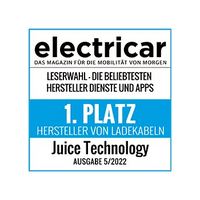Mileage tracking and kWh charges create more problems than they solve
Roads must be financed – that is undisputed. Therefore, it is right to consider today how the dwindling revenues from mineral oil tax will be compensated if the share of purely electric vehicles continues to grow. However, the two options that the Federal Council considered just over a year ago and submitted for consultation at the end of September 2025 – either a levy per kilometer driven within Germany or a levy per kilowatt-hour charged – are simply ill-conceived. Therefore, before any debate in Parliament, a comprehensive analysis of feasibility, consequences, and side effects must be presented.
Option 1 would be a mileage tax, requiring either the recording of domestic kilometers driven – via GPS trackers/apps – or self-declaration. Option 2, an electricity tax based on kilowatt-hours charged, would require calibrated, communicating meters at every charging point. On paper, both options may sound "polluter pays," but in reality, both options entail a massive technical and administrative effort, with major data protection concerns.
Why the mileage-based option raises questions
Technically, recording the kilometers driven within Germany can only be reliably accomplished with automatic trip recording using a tracking system. However, government-mandated monitoring behind the wheel via GPS trackers or apps raises legitimate data protection concerns. The alternative, self-declaration, is, to put it mildly, naive to the point of ridiculous: Should drivers seriously keep track of the distances driven within Germany? And who is supposed to monitor this? Garages or traffic authorities could at best check total mileage, but not separate domestic from international journeys. And what about plug-in hybrids or foreign vehicles? The proposal seems as if data protection, security against manipulation, and controllability have simply been forgotten.
Why the kWh levy is ill-conceived
The idea of linking the charge to the energy actually charged initially seems technically sound. But charging is not refueling. Electric cars are charged wherever they are parked – at home, at work, at the shopping center, at fixed wall boxes, with mobile chargers, or via emergency charging cables. To reliably and tamper-proof record every kWh charged, every charging station would need a calibrated meter, a permanent data connection, and a uniform backend. What was apparently not considered: Mobile devices and simple emergency charging cables for sockets easily evade recording. Photovoltaic self-consumption and bidirectional charging (V2G) are also simply not included in this model. Will all of this end up in a tax trap with double taxation? Moreover, charging processes in which the same device is made available to multiple users raise complex billing issues. This is no small technology project – it is a comprehensive infrastructure restructuring and a bureaucratic employment program.
Brake on industry and innovation
Metering requirements make charging stations more expensive, at the expense of consumers. At the same time, a rigid kWh levy on hardware blocks technological innovations such as bidirectional charging, local energy sharing, and decentralized grid services. Yet developments such as flexible demand response would contribute to grid stability. In short, instruments that make electromobility more expensive or more complicated reduce its attractiveness and its environmental benefits.
Administration, costs and acceptance
The announced deadline of 2030 to implement one of the above-mentioned proposals is completely unrealistic, given the pace of political processes and the subsequent technical and administrative implementation. Who will pay for development, infrastructure upgrades, ongoing communication costs, and administration? The government? The operators? The e-car drivers? And what supervisory authority will prevent data misuse, misappropriation, or miscalculations? Each option also raises questions of distribution and equity. All of these issues remain open. Without clear answers, there is a risk of additional bureaucracy, rising costs, circumvention opportunities, and declining acceptance – both among users and companies that operate charging infrastructure. Furthermore, an emissions or polluter-pays principle that does not properly regulate cases such as hybrids, foreign vehicles, self-consumption of PV, and bidirectional charging is unsuitable. It inevitably creates special rules, loopholes, and injustices.
“Overall, this would be another Swiss special tax for domestic electric cars with a questionable cost-benefit ratio.” – Christoph Erni
"Overall, this would be another Swiss special tax for domestic electric cars with a questionable cost-benefit ratio," says Christoph Erni, CEO and founder of Juice, and receives support from various quarters. For Jürg Grossen, President of GLP, Swiss e-Mobility, and Swissolar, the Federal Council has taken a wrong turn and is on a wrong turn – it wants to stall the e-mobility engine that is already running. Thomas Rücker from the Association of Automobile Importers also expresses incomprehension: Following the recently introduced import tax on electric cars, the new tax makes emission-free driving even less attractive.
A pragmatic, technology-independent proposal
Instead of mandating tracking systems or mandatory nationwide metering, a more streamlined administrative approach without a technological bias would be desirable. We propose determining a ratio of vehicle class, weight, power, and energy efficiency (e.g., using the existing energy label for passenger cars) and billing it via vehicle tax or a corresponding flat-rate levy. This model would have the following advantages: no GPS monitoring by the state, no stunting of innovation, no discrimination against technology or domestic charging station manufacturers, but instead a predictable, unbureaucratic process via existing tax channels and a polluter-pays approach within a reasonable framework. Furthermore, road financing and the CO2 Act would be regulated in one fell swoop.
Conclusion
Funding roads is necessary – but this goal cannot be achieved with means that do more harm than good. The instruments must be technically feasible, proportionate, and innovation-friendly. Mandatory GPS or comprehensive metering requirements for every form of charging are a dead end: They create significant technical and bureaucratic effort, distort the market, and stifle innovation. A practical, legally sound, and technology-independent solution must now be addressed. An environment minister who is serious about climate goals must promote e-mobility, not stifle it!
Read more here
- Electromobility in Switzerland
Electromobility in Switzerland | Juice Technology AG
Switzerland is growing in e-mobility – but tenants without their own charging infrastructure are particularly at a disadvantage. Learn why the "right to charge" is currently being discussed. - Charging your electric car at home: What do I need to know?
Charging your electric car at home: What do I need to know? | Juice Technology AG
Eight key questions about home charging – from sockets and wallbox performance to costs and safety features. - Can I connect a wallbox to a normal socket?
Can I connect a wallbox to a normal socket? | Juice Technology AG
Yes—it's possible safely with the JUICE BOOSTER. How temperature monitoring, adapters, and safety enable charging at household outlets. - What is bidirectional charging?
What is bidirectional charging? | Juice Technology AG
The electric car as an energy storage device: How V2G, V2H, V2L & Co. work — and what potential lies in grid and home use.
JUICE BOOSTER 2
The mobile wallbox that can do anything, even on the go:
https://juice.world/collections/juice-booster-2
The JUICE BOOSTER 2: portable charger with safety features — usable anywhere, even at household outlets.
JUICE BOOSTER 3 air
Intelligent charging in a compact format:
https://juice.world/collections/juice-booster-3-air
The JUICE BOOSTER 3 air combines mobility and smarts – with app control and dynamic load management.
JUICE CHARGER me 3
Future-proof stationary charging:
https://juice.world/collections/juice-charger-me-3
The JUICE CHARGER me 3 is a smart wallbox with load management — ideal for reliable, stationary charging.













